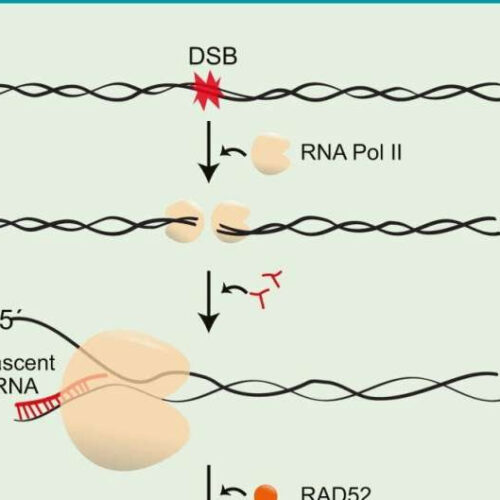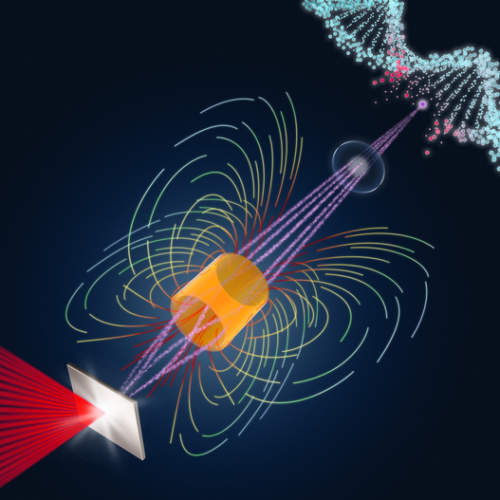California researchers and astronauts are studying cancer progression and treatment in space, leveraging microgravity to accelerate cellular aging and observe rapid tumor growth.Ebenezer Mensah California Researchers and Astronauts Collaborate on Cancer Research in SpaceCalifornia researchers, in a revolutionary approach to battling one of humanity’s oldest adversaries, have joined forces with astronauts to take their fight...
Tag: <span>cancer research</span>
The origin-of-life molecule, a key to cancer research
by University of Seville Schematic model of the regulation and role of RNAPII-generated nascent RNA to guide DNA end resection and DSB repair by HR. Credit: Nature Communications (2022). DOI: 10.1038/s41467-022-33027-z RNA, the molecule that gave rise to life, has been shown to be essential for repairing human genetic material and preventing mutations that might lead to...
Laser flashes for cancer research
HELMHOLTZ-ZENTRUM DRESDEN-ROSSENDORF IMAGE: A RESEARCH TEAM LED BY THE HELMHOLTZ-ZENTRUM DRESDEN-ROSSENDORF (HZDR) HAS SUCCESSFULLY TESTED THE IRRADIATION OF TUMORS WITH LASER PROTONS FOR THE FIRST TIME. CREDIT: HZDR / JUNIKS Irradiation with fast protons is a more effective and less invasive cancer treatment than X-rays. However, modern proton therapy requires large particle accelerators, which has...
Cancer research: Targeted elimination of leukemic stem cells
INSELSPITAL, BERN UNIVERSITY HOSPITAL IMAGE: ACTIVATED LIGHT/LTBR SIGNALING PATHWAY (LEFT) LEADS TO SYMMETRIC CLEAVAGE AND A PROPATATION OF LEUKEMIC STEM CELLS. CREDIT: A. OCHSENBEIN, UNIVERSITY HOSPITAL BERN Leukemia is caused by leukemic stem cells which are resistant to most known therapies. Relapses are also due to this resistance. Leukemic stem cells arise from normal blood-forming...
HDAC6 can control tumor growth and halt metastasis in triple-negative breast cancer
by George Washington University Genetic modifier HDAC6 was found to control tumor growth and halt metastasis in triple-negative breast cancer in vivo, according to a new study published in the top-tier journal Cancer Research by investigators at the George Washington University (GW) Cancer Center. Immunotherapy—the use of drugs to stimulate one’s own immune system to...
Cancer researchers discover how immune cells avoid killing themselves
By Michael Irving We have a lot to thank our immune systems for, as they remain ever-vigilant to protect us from cancer and infections. But exactly how do immune cells avoid wiping themselves out while attacking invaders? Researchers at Australia’s Peter MacCallum Cancer Centre and the University College London (UCL) have now found that they...
New treatment could ease the passage of kidney stones
by Massachusetts Institute of Technology Every year, more than half a million Americans visit the emergency room for kidney stone problems. In most cases, the stones eventually pass out of the body on their own, but the process can be excruciatingly painful. Researchers at MIT and Massachusetts General Hospital have now devised a potential treatment...
Senescent cells feed on their neighbours
Chemotherapy-treated cancer cells that enter a non-dividing state called senescence can nevertheless boost cancer growth. The finding that these cells eat neighbouring cells reveals a mechanism that enables senescent cells to persist. Michael Overholtzer Multicellular life requires individual cells to cooperate in a way that benefits the organism. Cells that are uncooperative because they are damaged or dysfunctional, and...
Can you ‘catch’ cancer?
Parasitic worms cause cancer — and could help cure it FRONTIERS Billions worldwide are infected with tropical worms. Unsurprisingly, most of these people live in poor countries, kept poor by the effects of worm-related malnourishment. What may surprise many is that worms also cause the majority of cancer cases in these countries. Published in Frontiers in Medicine as a special article...
Like racecars and geese, cancer cells draft their way to new tumor sites
NASCAR has nothing on cancer cells when it comes to exploiting the power of drafting, letting someone else do the hard work of moving forward while you coast behind. Building on the relatively new discovery that metastatic cancer cells leave tumors and travel in clusters, not singles, a Vanderbilt University team of biomedical engineers learned the process...
- 1
- 2



